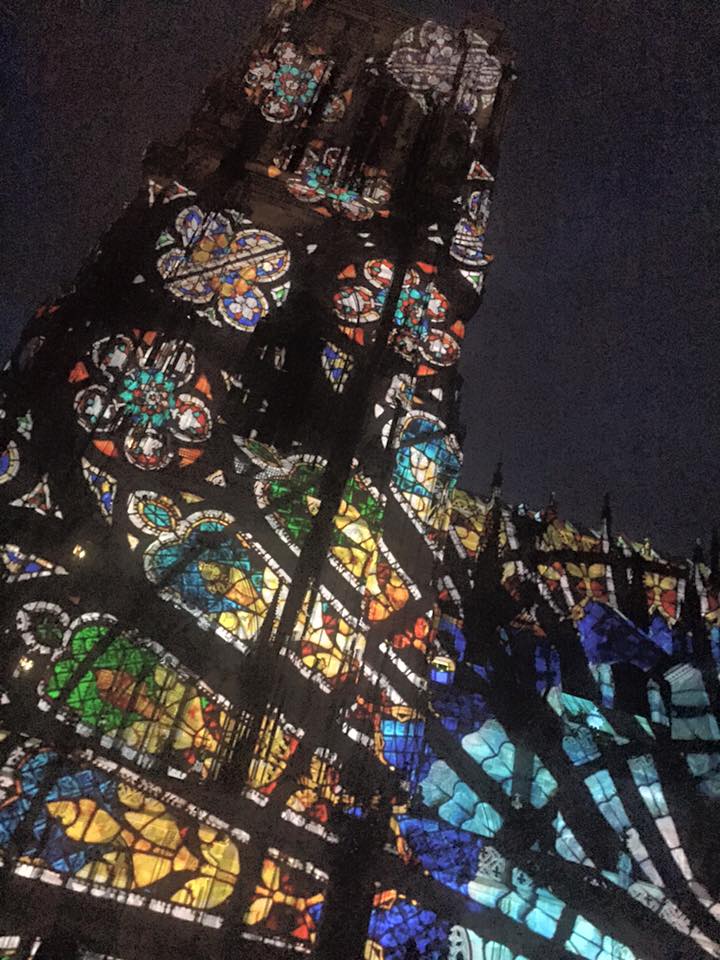Pre-departure:
Going on a 14-day, “see-everything” Eurotrip may be somewhat rewarding, but studying in a European city and exploring its surroundings is a lot better. My month in Strasbourg made me realise that the most fulfilling way to experience another culture and their traditions is all about learning a little of their language, shopping in their shops and sighing with them at tourists on segways.
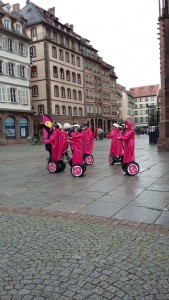
To apply for the bursary for the summer school, I had to fill in a form, write a motivational letter and submit a video of myself explaining why I wanted to go. The video proved to be a challenge, seeing that I’d never spoken in front of a camera before. Luckily, a good friend agreed to help me. It was awkward, there were many retakes (because of my laughter) and the video ended up very fragmented. Luckily, what mattered in it was the content. The video opened with me ordering a café at DCM – in French. I explained how I’ve never been outside of South Africa and really want to see more of the world.
I was super excited and nervous when I heard that I had been accepted for the bursary. Although the months that followed were quite stressful, it was all worth it. Here are a few tips about the admin-laden stages before the fun:
- Do research: be informed about how to get around and outside Strasbourg: look at how to get to the surrounding forests, castles and wine farms (eg. car, bike rentals);
- Plan the things you want to see in France and its surroundings (find the things that a camera wouldn’t be able to capture. I have always wanted to see Florence and the Machine live, so I went to a festival where they performed). Take into account that you will meet awesome people at the summer school – don’t book away all your weekends.
- Booking flights and transportation: planning is important. If you plan to be in Paris at the end of your trip, it is a good idea to book a return flight to Paris;
- The Visa: patience is key. Make sure to have all the necessary documents, especially those proving your transportation for getting to Strasbourg (flight AND bus/train). I could only get an appointment for two weeks after booking, but it took only a few days to be issued).
It was my first time flying internationally. Because of this, I was advised (luckily) that I should avoid flying on my own. Marcus, one of the other three SU-students going to Strasbourg, agreed to travel with me. We booked our tickets to Frankfurt, Germany and a bus from there to Strasbourg. Our flight was booked for the afternoon after my second opportunity examination, and our bus set to arrive in Strasbourg the evening before the program would start.
At the summer school:
When we arrived in Strasbourg, excitement kicked in. The course coordinator showed us our apartments, where we later found that some of us didn’t have forks; others no plates or cups. On our beds we found couch-pillows (square shaped) for us to sleep on. As the French say, however, c’est la vie. We are students who make the best of what we have. My flatmate, Silvia, arrived soon after. We had a bathroom, bedroom and a spacious (sokkie- and flamingo-friendly) living room with a red couch (which became the “Help! I lost my key!” bed) and a tiny kitchen.
Since the residence is directly behind the university, it took about 3 minutes to get to class. The cafeteria in the university building was only open for breakfast and lunch. Fortunately there was a supermarket nearby, as well as a Domino’s, Post Office, a bakery and a nice market right across the street two times a week. Here, I have to pause and admit: I ate at least 30 pain au chocolat during my month in France (luckily all the walking paid off). When in France, try the bread (and cheese and wine). They don’t have a bakery on every corner for no reason.
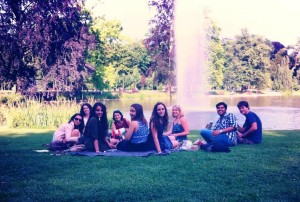
To me, public transport was a foreign, scary concept at first, but it was essential for survival to learn how Strasbourg’s tram- and bus lines work. Unfortunately we were part of the second session summer school, which stretched from middle June to middle July, and could consequently not reap benefits from buying a monthly pass. For the trains, however, I bought a carte de jeune (youth card) for €36, and it meant that I got 25% off on all train tickets. Although you can buy tickets online at SNCF’s website, I found it easier and sometimes cheaper to go to the train station to buy my tickets. It helps to know French phrases like “de Strasbourg à Paris” (from Strasbourg to Paris). Generally, if you start a sentence in French or just show that you try to understand French, it usually invites laughter and friendliness.
When visiting any country, it is important to know the basics of the language and culture. This doesn’t mean that you must be able to construct sentences, but just knowing “bonjour”, “merci”, “de rien”, “pardon” and “où est …” are good to start off with. It is further a good idea to book/ sit in train seats where there is somebody opposite you – by doing this we once, on our way to a festival in northern France, made friends with Remy, a local who showed us around at our destination.
The business and economics sections of the course were a challenge for me as a BA student. Luckily we had incredible lecturers. The classes were longer than what I am used to: some were 3 hours, others 5 (with breaks after every 90 minutes). We had three main subjects: European Integration, Business in Europe and French.
French was great, and we could practise it outside. There were two groups: beginners and intermediate and we completed tasks according to our levels of French. The tasks (prepared in class) were always a challenge but never too threatening and always worth every minute put into them. If I knew more about teaching foreign languages, I would recommend that SU’s French lecturers also teach according to French levels and let the students do more prepared-in-class practical work than stressful, pre-arranged orals.
On one 40°c day, the French lecturer divided our Intermediate class into groups and sent us on a mission with a list of destinations all over Strasbourg. We had to find everything on the list by asking locals for directions in French. More than two hours later we found our way to the square (the meeting place), where we joined 6-year-old locals for a dip in the fountain.
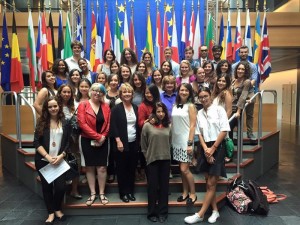
The subjects of Business in Europe were Human Resource Management, Marketing and Strategy for Art organisations. Human Resource Management taught us more about how the cultures of specific countries in Europe will affect a business. In Marketing, we learnt about analysing a market and how to develop a strategy accordingly.
In European Integration classes we learnt more about Logistics (imports and exports) and about the political economy of Europe – especially concerning the formation of the European Union. The most fascinating part of these classes was learning about Greece in the midst of their economic crisis. We were lucky enough to visit the European parliament in Strasbourg while well-known European personalities passionately debated about the situation in Greece.
When we were not in class or on outings, we explored the city. Strasbourg has much to see and do; my favourite being its beautiful Notre Dame cathedral. The town celebrated the cathedral’s 1000-year birthday with illumination shows every night from July to September.
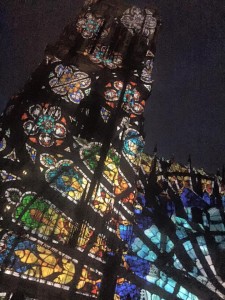
During the weekends I visited the French Alps, went to the Beauregard festival in Caen, and saw the Venice-like “streets” of Colmar – a town nearby Strasbourg. After the last days of the Summer School, Renier (another SU student) and I went to absorb the magic of Paris before returning home.
Returning Home:
Before Strasbourg, I never imagined what it would mean to get to know people from more than 10 different cultures. In South Africa and especially in Stellenbosch we have a diversity of people, but I’ve never been in contact with such a variation of cultures in my day to day life before. It made me realise how limited I tend to make life for myself in Stellenbosch, and inspired me to transcend the cultural boundaries that I subconsciously set for myself.
I expected to learn French in France, without being able to predict all the other languages that I would hear along the way. The students attending the course with me spoke Spanish (Spain, Argentina, Mexico), Chinese, Bulgarian (Bulgarian studying in Scotland), Hindi (Indian studying in England), American English, British English, Australian English, Russian, Kazakh and Lebanese. On our first day, at the welcoming dinner, the Mexican and Spanish students around my table were talking in Spanish. They were intrigued at how their Spanish accents differed. I was amazed at how I could follow some of their conversations by looking at their hands and picking up random words. It was also interesting for me to see for example the Bulgarian or Hindi alphabet, and to grasp how entirely different it is from the languages that I am used to.
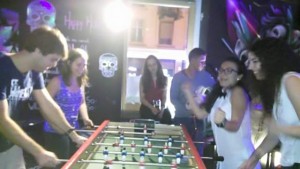
My month among such a rich diversity of different people made me realise how incomprehensibly big the world is. It was completely baffling to realise that, just like the different cultures and accents in South Africa, every other country has its own varying traditions. It would be impossible to ever see or just know about everything that all the world’s countries and people have to offer (but we can try).
It was difficult for me to admit to myself that, while I have spent all this time wanting to learn French, I only know two of South Africa’s languages. Yes, we taught the other students at the summer school how to sokkie and say “dankie”, but it was difficult to explain how this is only a small part of South Africa. It was difficult to admit that I don’t know about all that our country has to offer. I have now made it my mission to see more of South Africa and learn more of our languages and traditions. At the same time, the experience in France has opened up my eyes to and made me hungry for all the opportunities that are available internationally.

